Liberal support recovers slightly
August 21, 2020
After several weeks of downward pressure caused by the WE Charity matter, Liberal support is showing some signs of recovery.
An election today would see the Liberals (36%) with a 6-point margin over the Conservatives (30%) and the NDP further back with 18%.

The regional patterns show the Liberals ahead of the BQ by 8 in Quebec, ahead of the Conservatives by 15 in Ontario, ahead of the Conservatives by 7 in BC, and leading by 16 in Atlantic Canada, with the NDP and Conservatives trailing. The Conservatives widened their advantage over the Liberals in Alberta and Saskatchewan. The Liberals could win re-election based on these numbers.
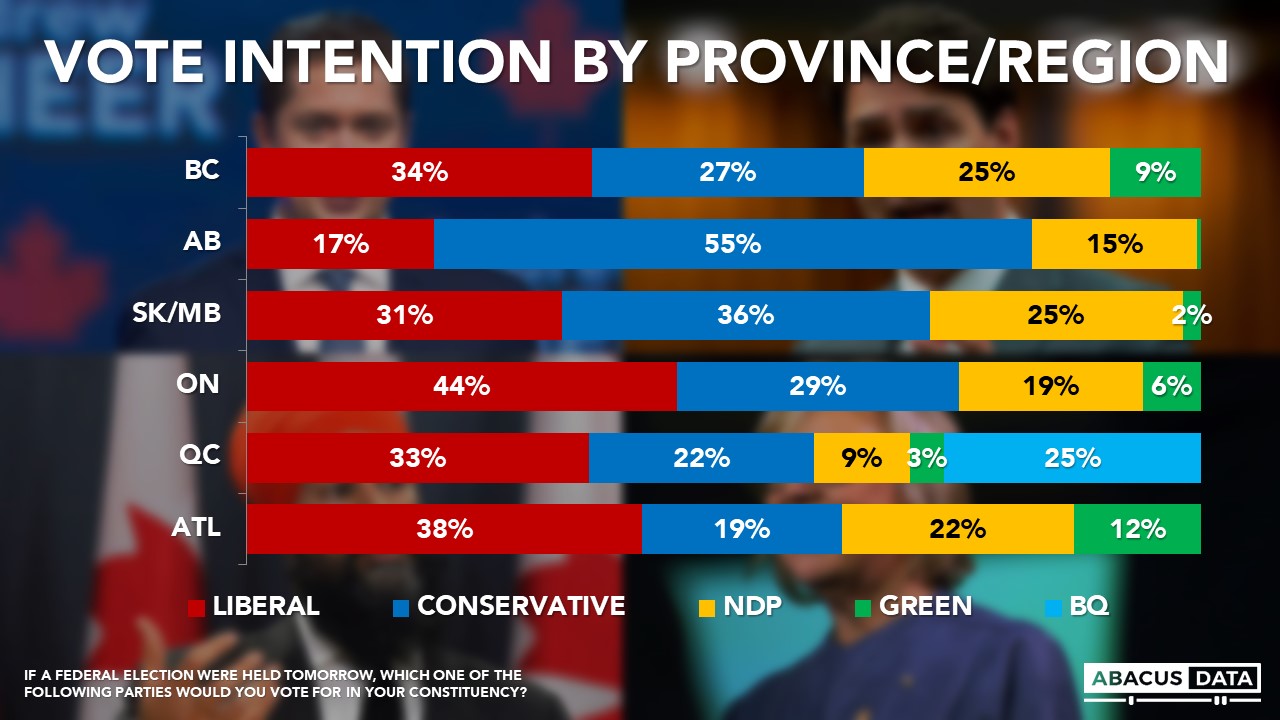
Impressions of Prime Minister Trudeau also improved from our last measurement, by 4-points. As he prepares to leave the leadership of the Conservatives, impressions of Andrew Scheer remain decidedly more negative (47%) than positive (21%). Views of NDP leader Jagmeet Singh are stable at 35% positive and 26% negative.
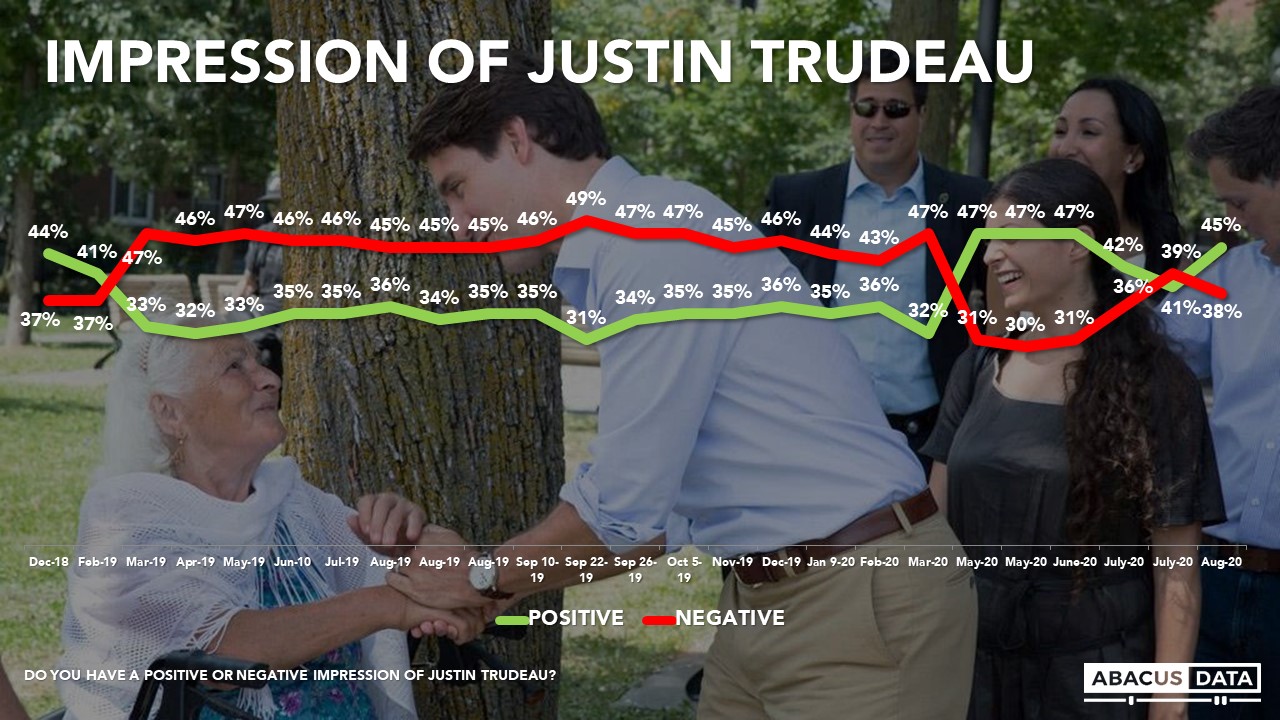
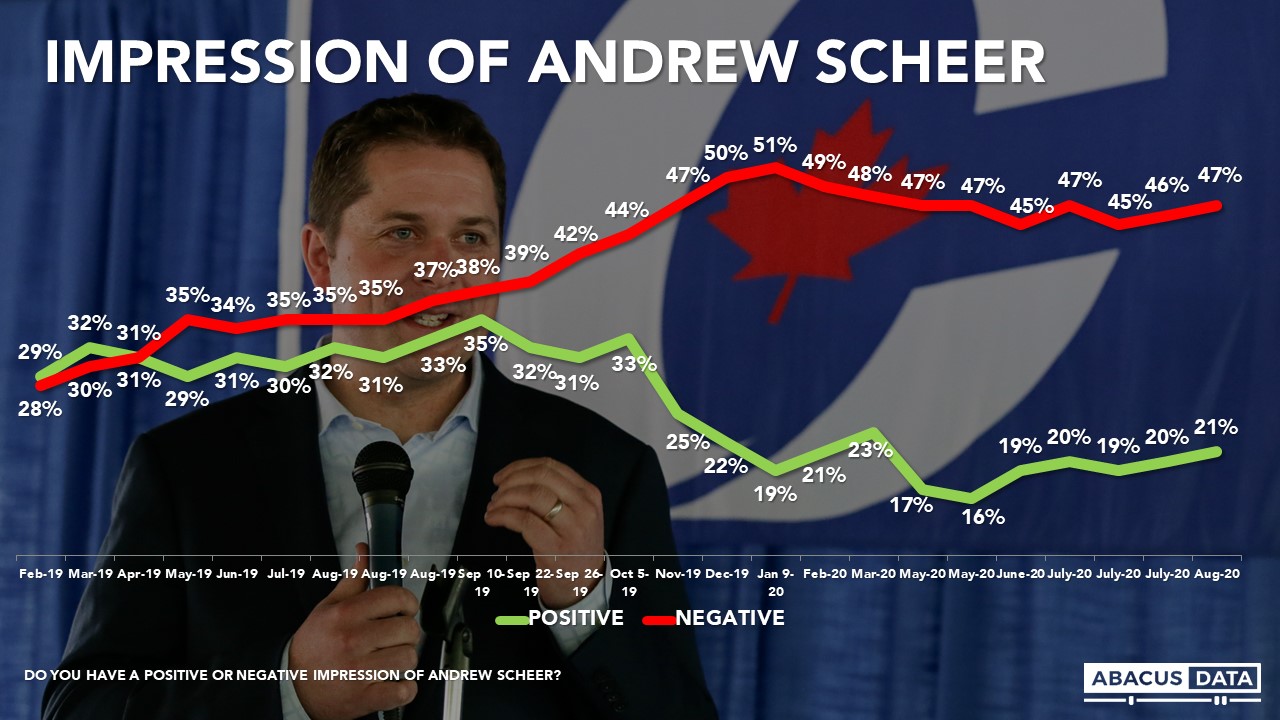

Approval of the federal government had been declining for three straight measurement periods. Still, that decline has stopped in this survey, with 45% saying they approve of the job Ottawa is doing and 38% disapproving. A year ago, in the wake of the SNC scandal, those numbers were the reverse, with 36% approval and 45% disapproval.
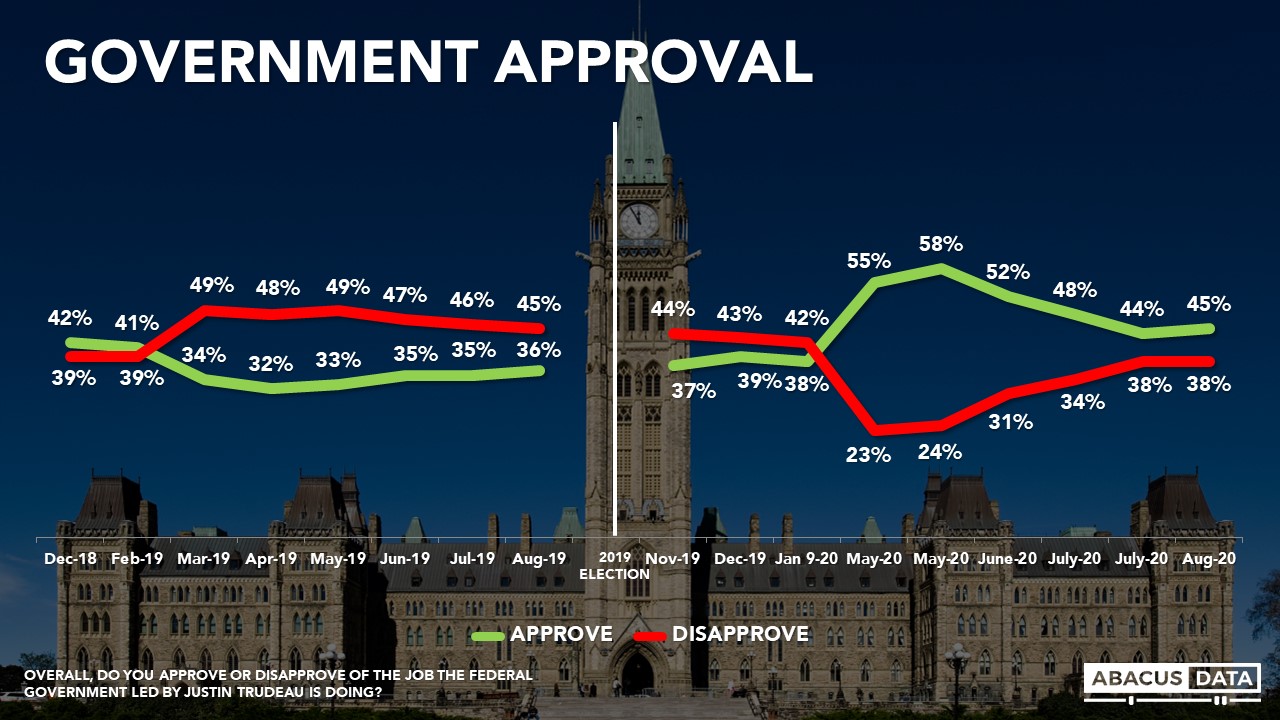
The accessible voter pool for the Liberals has not been materially affected by the WE matter, with 53% saying they would consider voting Liberal, compared to 46% for the NDP and 44% for the Conservatives.

The Liberal Party has an 11-point advantage in accessible voter pool compared to the Conservatives in BC, a 20 point advantage in Ontario, a 27-point advantage in Atlantic Canada. In Quebec, the Liberals have an 11-point advantage over the Conservatives and the NDP, and a 7-point advantage over the BQ.
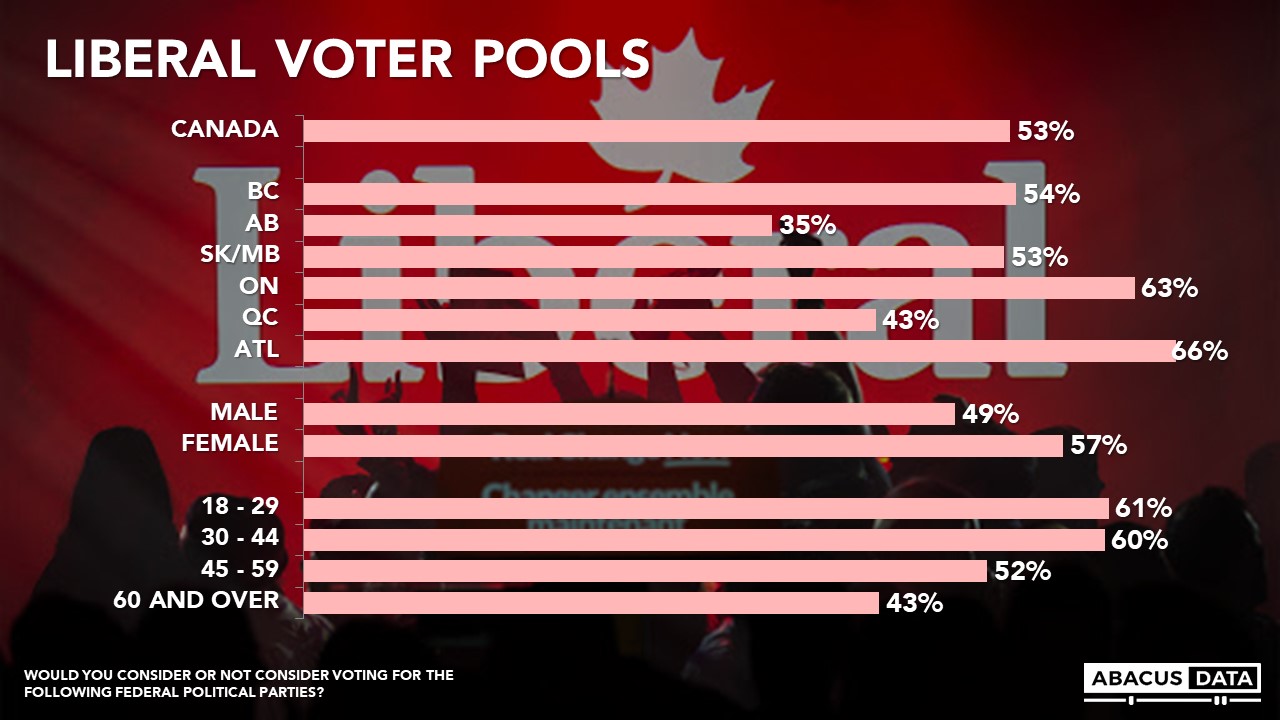
For the Conservatives, their accessible voter pools are massive advantages in the Prairies. Only 32% of Quebecers would consider voting Conservative.
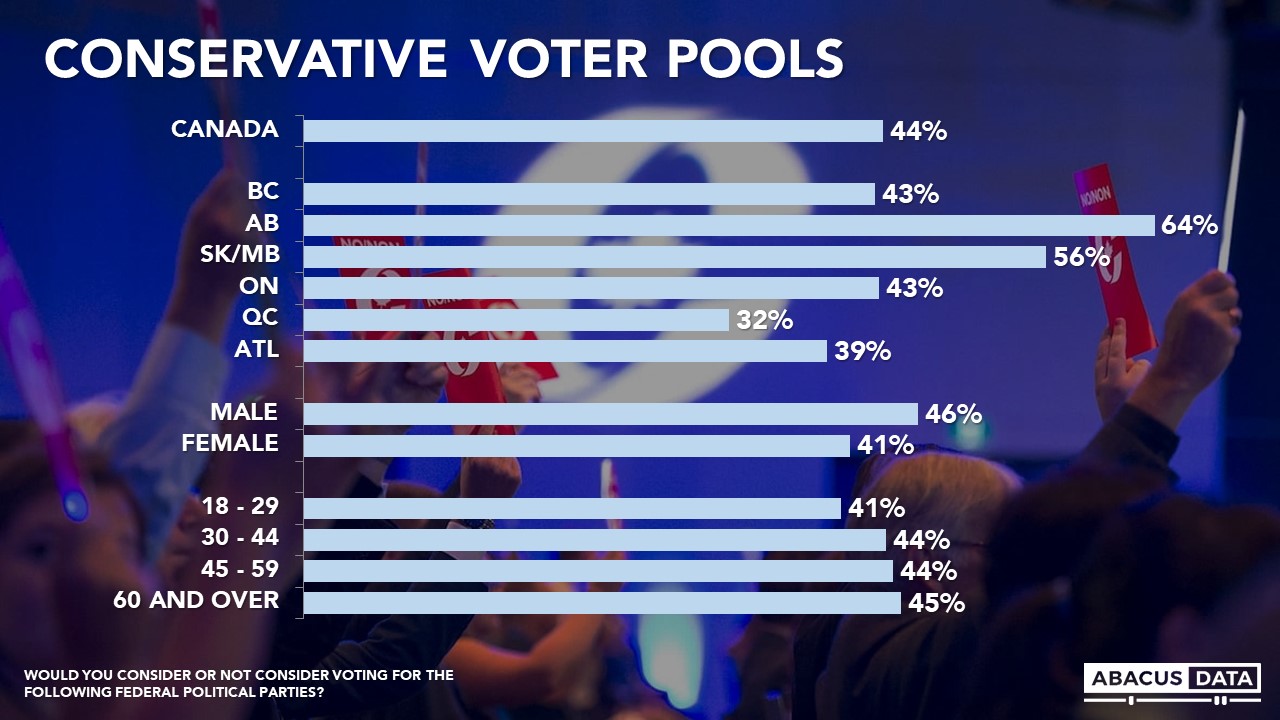
The NDP finds more extensive accessible voter polls in BC, Atlantic Canada, and Ontario, where about half of people in those regions open to voting for the party. Only 1 in 3 Quebecers are open to voting NDP. More importantly, while the voter pools for the Conservatives and Liberals are relatively consistent across age groups, the younger Canadians are much more open to voting NDP than older Canadians. Only 30% of those aged 60+ would consider voting NDP, half as many as those aged 18 to 29.

UPSHOT
According to Bruce Anderson: “Canadians generally seem to have returned their focus to everyday life, enjoying what’s left of the summer, managing life during COVID, the return to school, the future of the economy, the election in the US. The Conservatives have an opportunity to re-set their party with a change of leaders in the next week, but so far, many Canadians are not looking for a fundamental change in direction. Anxiety is high about many things, but skirmishing in Ottawa is not at the top of that list of things for many people, it seems.”
According to David Coletto: “The bleeding from the WE controversy seems to have stopped, and Liberal support has rebounded, giving the incumbents a healthy lead over the Conservatives. The Prime Minister’s image has improved over the past few weeks.
As the Conservatives select their new leader this week, the party finds itself in one of its weaker positions over the past decade. It continues to have a smaller accessible voter pool than either the Liberal or New Democratic parties. Andrew Scheer remains the most unpopular national party leader. Whoever becomes Conservative leader will have a lot of work to expand the party’s appeal. Despite all the challenges the Liberals have faced over the past few months, the party’s support is stuck in the low 30s.”
ABOUT ABACUS DATA
We are the only research and strategy firm that helps organizations respond to the disruptive risks and opportunities in a world where demographics and technology are changing more quickly than ever.
Find out more about what we are doing to help clients respond to the COVID-19 pandemic.
We are an innovative, fast-growing public opinion and marketing research consultancy. We use the latest technology, sound science, and deep experience to generate top-flight research-based advice to our clients. We offer global research capacity with a strong focus on customer service, attention to detail and exceptional value.
We were one of the most accurate pollsters conducting research during the 2019 Canadian Election.

Contact us with any questions.
Find out more about how we can help your organization by downloading our corporate profile and service offering.
METHODOLOGY
The survey was conducted with 1,500 Canadian residents from August 14 to 19, 2020. A random sample of panelists were invited to complete the survey from a set of partner panels based on the Lucid exchange platform. These partners are typically double opt-in survey panels, blended to manage out potential skews in the data from a single source.
The margin of error for a comparable probability-based random sample of the same size is +/- 2.6%, 19 times out of 20.
The data were weighted according to census data to ensure that the sample matched Canada’s population according to age, gender, educational attainment, and region. Totals may not add up to 100 due to rounding.





